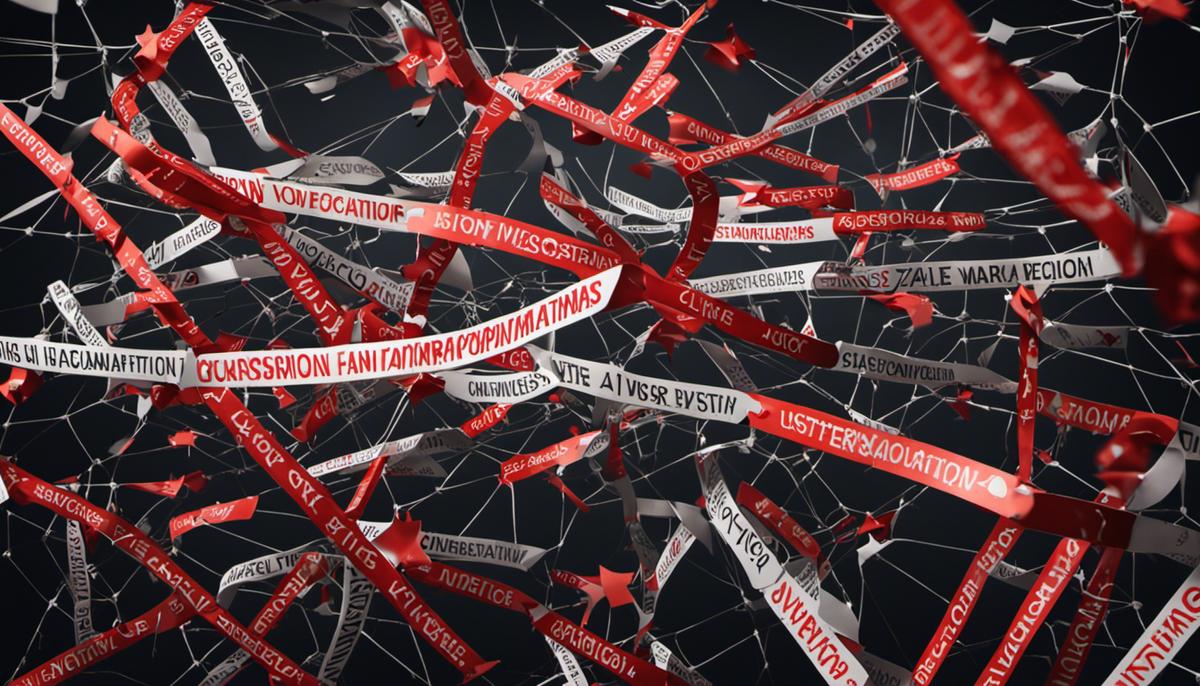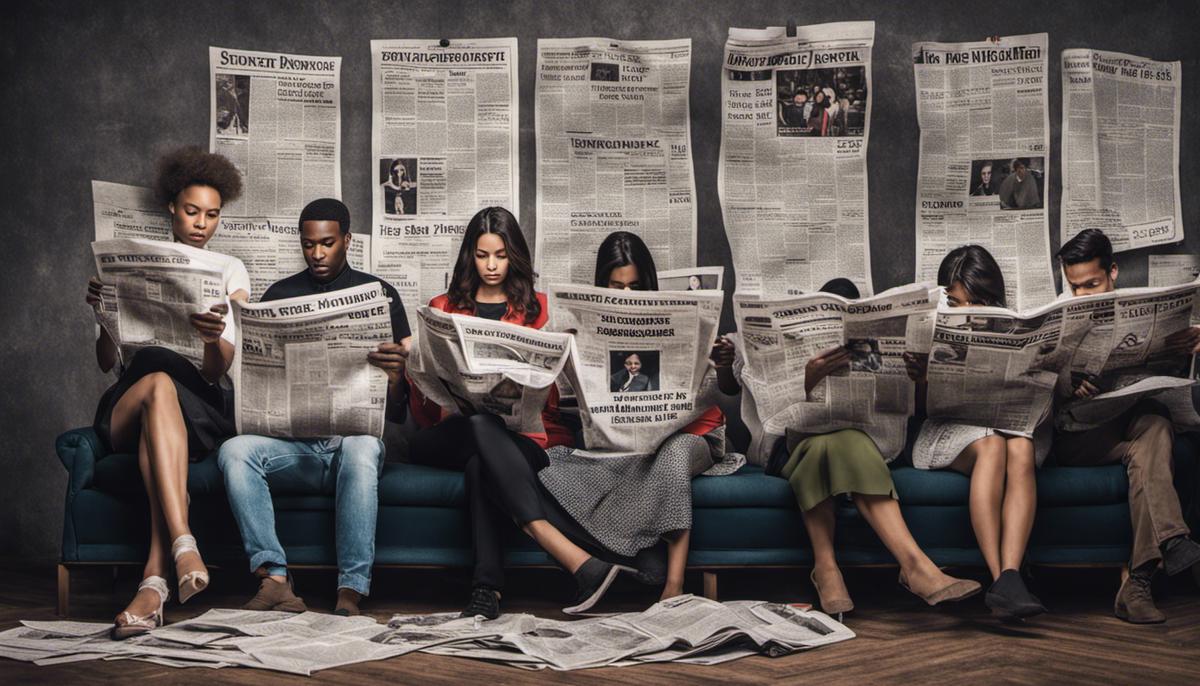As we collectively traverse the 21st century, a timely exploration of primal issues that threaten the integrity of our societies becomes critical. Paramount among these is our understanding of the nuanced dilemmas of misinformation and disinformation that seem to pervade our digital landscape. Catalyzed by ever-evolving algorithms and echo-chamber effects inherent in modern systems, these phenomena lead to an escalation of widespread false narratives that ultimately compromise the essence of democracy and chip away at our civil liberties. The ramifications of these disruptions are far-reaching—altering perceptions, manipulating public sentiment, and even swaying electoral outcomes in some instances. Thus, the need for comprehensive knowledge about these phenomena and strategies to combat them is greater than ever before.
Table of Contents
Understanding Disinformation and Misinformation
The Inherent Characteristics of Disinformation and Misinformation: A Study in Information Distortion
Data, the lifeblood of contemporary societies, is frequently subject to various forms of distortion: disinformation and misinformation. To fully grasp the gravity of these pernicious phenomena, it behooves us to delve deeper into their inherent characteristics.
Without digression, the essence of misinformation lies in the dissemination of inaccurate assertions, usually without concocted intent. It is crucial to underline that misinformation is not necessarily synonymous with deceit, as the parties involved are often unaware of the inaccuracy of the information relayed. Thus, it can be summed up as false information shared inadvertently, despite intentions of veracity.
Disinformation, on the contrary, depicts a darker chapter of information distortion where erroneous assertions are deliberately fabricated and circulated with the intent to deceive. Here, the falsity of information is coupled with premeditated manipulation, making disinformation a particularly virulent strain of false information.
Let’s dissect both phenomena further.
First, consider misinformation. Its key features include a lack of intent, potential ubiquity, and potential for harm. Misinformation often stems from misconceptions, misunderstandings, or incomplete knowledge, leading to an unintentional spreading of falsified data. The ubiquity of misinformation is a concern, given that any individual could inadvertently become a conduit. Lastly, despite its inadvertent nature, misinformation can still carry grave implications, influencing decision-making processes and fostering misplaced beliefs based on erroneous data.
Second, the myriad characteristics of disinformation include intentional deception, strategic targeting, and a high potential for societal destabilization. The disseminators of disinformation aim to mislead intentionally, employing sophisticated techniques to veil their efforts. Modern technology provides an effective platform for disinformation, facilitating its rapid spread. Accordingly, disinformation is often tactically tailored to influence specific segments of society, making its impact particularly destructive.
Both misinformation and disinformation have irrefutable potency for significant societal harm, distorting public opinion, undermining trust in institutions, and threatening democratic processes. However, armed with a deep understanding of their intrinsic characteristics, societies can endeavor to build resilience against these threats.
Investigating these pivotal aspects of our information age further contributes to the bodies of knowledge in information science, cognitive science, sociology, and beyond. Our collective defense against the age of disinformation and misinformation relies heavily on dispelling the myths that surround them and steadily building our understanding.
In conclusion, the intricate dance of disinformation and misinformation within our society requires ongoing research and vigilance. It is imperative to recall the Africana proverb: “A lie can run around the world before the truth has even got its boots on.”
This is the imminence of the task we face in an era where distortion sees no borders. The pursuit of truth may become arduous, yet it remains the noblest of endeavors in the grand cosmos of knowledge.

Impact of Misinformation and Disinformation on Democracy
Undeniably, in the age of instant, global communication, as misinformation and disinformation propagate, integral democratic values begin to erode. Through a comprehensive exploration into the mechanics of this phenomenon, a robust understanding of its depth and scope can be delineated.
Political discourse, particularly in democratic societies, is dependent on the free exchange of accurate information. However, when an influx of false narratives is disseminated, it creates an environment that is detrimental to the foundational pillars of democratic societies, such as informed decision-making and public accountability.
It’s an intriguing paradox. Technological advancements, in theory, ought to facilitate democracy by enabling widespread dissemination of information, eliminating information asymmetries, fostering equitable participation and promoting transparency. Instead, as it stands, they have become conduits of deception and confusion, instigating a culture of skepticism.
Consider the critical value of a pluralistic society; diverse opinions underpin the democratic process. The ideal scenario is an environment wherein citizens absorb a wide variety of ideas, and instinctively challenge those that fail fact-checking scrutiny. Paradoxically, in an era of misinformation and disinformation, this openness can transform into a liability. Instead of inviting an array of ideas, it allows the destructive potency of false narratives. The decision-making process becomes a victim of the echo chamber effect, pushing public opinion towards extremes and creating a deep societal divide.
Additionally, misinformation and disinformation have a profound influence on the public’s perception of democratic institutions. For instance, false narratives about election fraud, misconduct in office, or ill intentions can engender deep-rooted suspicion and mistrust in democratic systems. Ultimately, this can lead to citizen disengagement – a profound threat to the democratic process.
This phenomenon is part of the larger, alarming trend of cognitive hacking—manipulating people’s perceptions and decision-making abilities by flooding their cognitive environment with falsehoods. This approach disrupts social harmony, undermines democratic frameworks, and challenges the efficacy of democratic governance.
Apart from the public discourse, these mal-practices also find their way into legislative halls, courtrooms, and other institutional bodies, obscuring the truth, impeding impartial inquiry, and obstructing truth-seeking procedures. Fundamentally, it depreciates the value of truth, the bedrock of any democratic process.
To counter these threats, a comprehensive and multi-pronged strategy is required. Educating citizens, fostering media literacy, promoting open dialogue, and regulating the tech industry are paramount. Moreover, developing a culture of critical thinking and skepticism could empower individuals to discern and resist such tactics. Consequently, an environment hostile to misinformation and disinformation can be cultivated, which champions truth, encourages fact-based dialogue, and upholds the ideals of democracy.
It is, therefore, incumbent upon us to continuously delve into this burgeoning field of study, and foster collaborations amongst scholars, cybersecurity experts, social scientists, and policymakers. Democratic societies hang in the balance, and only through rigorous evaluation, and pro-active, effective measures, can we hope to counter this existential threat.

Misinformation, Disinformation and Erosion of Civil Liberties
The proliferation of disinformation and misinformation has collateral damage far beyond the immediate disruption of factual narratives. Among the most distressing casualties are civil liberties, cornerstones of democratic societies that are fundamentally imbued with the ideologies of free thought, free speech, and individual autonomy. Indeed, the scope of disinformation stretches out to tamper with these liberties in a manner that threatens the bedrock of democratic social structures.
By creating an environment of constant doubt and suspicion, disinformation disrupts the proper functioning of civil liberties. Individuals, immersed in a sea of false narratives and misleading information, may find their freedom of expression curtailed. Fearful of being embroiled in the propagation of fallacies, individuals might curtail their utterances, leading to a chilling effect on free speech – a phenomenon referred to as libel chill. This is not a scenario conjectured from the abstract but is a sentiment increasingly manifesting in a world heavily dependent on the spread of information via digital platforms.
Simultaneously, the freedom of thought, intrinsically tied to individual autonomy, gets jeopardized in the face of disinformation. Installed in a symbiotic relationship with the freedom of expression, the freedom lies in jeopardy as thought processes are inherently guided by the quality and authenticity of available discourse. When an individual’s informational diet is saturated with falsities, their thought processes may be involuntarily subverted, largely undermining the very concept of free thought.
Misinformation, being the unintentional spread of false information, induces a landscape of misinformation assumptions. These arise when people live their lives on the basis of untrue facts or are unperturbed by the potential harm it may inflict. Respect for other’s rights and overall tolerance level erodes as society becomes progressively misinformed. One may argue that an individual has a right to be misinformed. However, when misinformation becomes widespread, it has the potential to undermine the civil liberties not just of that individual, but of everyone.
Further, civil liberties are intrinsically entwined with social harmony and mutual trust. Integral to social harmony, mutual trust provides stability and consistency to societies. Disinformation, by virtue of fostering discord and sowing doubt, has the potential to erode this foundational element of societal function, thereby directly encroaching upon civil liberties.
Countering this formidable threat necessitates a strategy that is holistic yet specific in application. Education, policy-making, technology regulation, and an unwavering commitment to truth are all crucial components of such a strategy. A particular mention must be extended to education, which is fundamental in fostering cognitive resilience, in individuals and societies alike, against the machinations of disinformation.
Thereupon, the quest to uphold civil liberties in the face of misinformation and disinformation is one doused in complexity. Nevertheless, through concerted efforts across societal segments – from individuals to institutions – it is a challenge that can, and must, be overcome. After all, civil liberties – the guarantees of individual autonomy, dignity, and freedom – must not be mere echoes of a distant and idealized democratic past. They must be vibrant reassurances of a just and equitable future.

Mitigation Strategies
A rigorous, comprehensive approach towards mitigating the erosion of civil liberties due to misinformation and disinformation should encompass certain vital components. Chief among these is the global reinforcement of media literacy education, which involves training individuals to critically examine, question, and evaluate the vast arrays of information they encounter daily. This could empower them to distinguish fact from faux, enhancing their cognitive immune system against misinformation.
Further, technology companies must proactively take steps to regulate and monitor the content disseminated through their platforms. In the face of technological advancements facilitating the rapid circulation of misinformation, the need for a robust system to identify and curtail fraudulent information has become increasingly essential. This is not to advocate for outright censorship; contrarily, it underscores the importance of safeguarding the digital information ecosystem integrity.
In the same regard, governmental bodies could play a pivotal role by creating policies and laws that encourage transparency and accountability within the media and digital platforms. Regulatory mechanisms that inhibit the propagation of false information, without infringing upon freedom of speech, could serve as a strong deterrent against those seeking to distort public opinion and disrupt social order through disinformation.
Civil society organizations also play an instrumental role in this fight. They could provide counter-narratives to hateful and polarizing misinformation, foster dialogue and understanding in divisive times, and promote a culture of respect for contrary views. Noteworthy is the fact that civil liberties gain robustness from a society that can accommodate differing viewpoints without resorting to misinformation or disinformation as tools of argument and persuasion.
Emphasizing the importance of fact-checking agencies and tools is also key. These organizations, by acting as information gatekeepers, promote truthfulness and accuracy in the many streams of news and information that deluge citizens daily. Encouraging the regular use of such verification tools could prove instrumental in curbing the spread of misinformation.
Simultaneously, a cross-sectoral approach alongside multi-stakeholder collaboration is productive in addressing this multifaceted issue. It is a realm where academia, cybersecurity, policymakers, data analysts, and social scientists need to intermingle, bringing their collective know-how to bear.
Moreover, experts have posited the advantages of adopting a public health model to tackle misinformation and disinformation. Just as we inoculate ourselves against various diseases, a similar proactive approach to misinformation – inoculating minds with the tools and strategies to resist fraudulent information – could yield promising results.
Remember, safeguarding civil liberties does not denote the absolute freedom to propagate disinformation without restraint. Rather, it embodies the preservation and promotion of a well-informed citizenry capable of engaging in productive discourse and decision making.
Ultimately, addressing the challenge of misinformation and disinformation and their pernicious impact on civil liberties requires the collective consciousness and concerted effort of every societal segment. To be sure, this is not a task of taming a behemoth but more a persistent rendezvous with progressive systemic alterations, perfecting our safeguards, and continually striving for resilience against this pervasive menace. Indeed, therein lies the crux of our endeavor. The aim and challenge for us all – the preservation of civil liberties amidst this age of information dynamism.
In essence, civil liberties – our collective conscience and mutual respect for one another’s rights – undergird the very foundation of a democratic society. The need to safeguard these liberties against the undermining swathes of misinformation and disinformation cannot be overstated. Preserving these liberties, while striving for a more discerning and resilient populace, would indeed be the cornerstone of a just, equitable future.

While the aggressive spread of misinformation and disinformation presents a daunting challenge, it is not insurmountable. By fostering an environment encouraging critical thought, enforcing stringent regulations, and promoting a culture of accurate fact-checking, society can do its part in quelling the spread. Harnessing the potential of emerging technologies, such as Artificial Intelligence, in conjunction with educating citizens about the importance of vetting information before consumption, can aid in mitigating the impact of these phenomena. As we move forward, nurturing a shared responsibility towards acknowledging and addressing these complexities will not just safeguard our democratic processes, but ensure the preservation and strengthening of our fundamental civil liberties.

Matt Smith is a seasoned journalist and author whose expertise spans across the dynamic realms of Politics, Gadgets, Gaming, and a plethora of general interest topics. With a Master’s in Political science and tech pedigree shaped in Silicon Valley, Matt brings a wealth of knowledge and a critical eye to everything he writes.
Politics: Matt offers sharp political commentary, drawing from his experience as a political analyst and his academic rigor.
Gadgets: His tech insights are grounded in real-world experience, having been on the front lines of innovation with a degree from Caltech.
Gaming: A respected voice in gaming, Matt’s reviews and trend analyses are a testament to his deep involvement in the gaming community.
General Topics: From science to culture, Matt’s writing spans a broad spectrum, engaging readers with a blend of expertise and relatable prose.
Engage with Matt’s compelling content for a fresh perspective on the issues at the forefront of today’s discourse.

